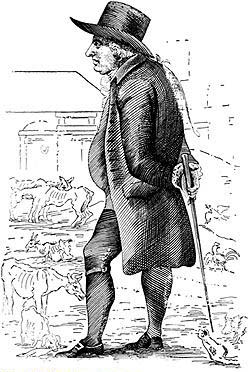Baron d'Aguilar
Portuguese Baron of the Holy Roman Empire
1739 - 1802

Property acquisition
In addition to the Broad Street house d'Aguilar acquired properties in Sydenham and on Bethnal Green where he pastured cattle amongst the wealthy Jewish community. He also owned 15,000 acres of land with an elegant mansion, in America. He lost this property following the War of American Independence and, at the same time, separated from his wife. It appears that these events affected his personality and he is said to have become 'rude, slovenly and careless of his person and conduct, totally withdrawing himself from his family connections, and the gay world. He latterly affected the appearance of poverty, though notwithstanding his losses, ... he still possessed much more than a competency, having considerable property, consisting of houses, land, merchandise, goods, jewels, diamonds ...'
In 1780 he took a lease of Highshot House in Crown Road, Twickenham, remaining until 1789. Writing to Mason on 9 June, 1780 Walpole noted that d'Aguilar's coach had been shot at "in the lane close to the Crown". The coach, emblazoned with his coat of arms, was a totem for d'Aguilar: he had it made when he was first married and kept it for the remainder of his life, an ostentatious and provocative vehicle.
During this period he sold his properties (though keeping grazing land at Bethnal Green) and bought land in Colebrooke Row, Islington. Here, on 84 acres, he kept animals, the establishment acquiring the name “Starvation Farm” because he did not feed his livestock properly. He also acquired a house, 21 Camden Street and another house in Shaftesbury Place, Aldersgate where he died on 16 March, 1802, intestate. He was buried in the Jewish cemetery in Bevis Marks. His two legitimate daughters inherited his estate, valued at £200,000. His coach, stored at the farm and decrepit was sold for the value of its springs.
Diego (Moses) Lopes d'Aguilar, 1st Baron
Diego Lopes d'Aguilar, the father of Ephraim, was born, probably in Oporto, Portugal in 1699. He was a Marrano, that is to say a Jew affecting the protection of Christianity under the eye of the Inquisition and so liable to persecution. He married Donna Simha da Fonseca (d1755), and left Portugal for London in 1722. Soon after this he moved to Vienna where he became the confidante of the Empress Maria Theresa. As her adviser he achieved considerable power and wealth as State Treasurer and Controller of tobacco importation and taxation. She commissioned him to oversee the building of the Schönbrunn Palace on her behalf.In 1726 the Empress appointed him Baron of the Holy Roman Empire and Privy Counsellor to the crown of the Netherlands and Italy.
Being threatened with extradition to Spain by the Inquisition, having openly reverted to Judaism, he returned to England in 1749, where he spent the remainder of his life.
Further reading
'Bethnal Green: Judaism', A History of the County of Middlesex: Volume 11: Stepney, Bethnal Green (1998), pp. 240-41. URL: http://www.british-history.ac.uk/report.asp?compid=22765.Notes & Queries 21 July 1928. “Baron d'Aguilar and Starvation Farm”
Jewish Encyclopedia
Henry Wilson, “Wonderful Characters” vol ii, p92
Pieter Zwart, Islington, a History and Guide
William Howitt, the Northern Heights of London: or Historical Associations of Hampstead, 1869
John Nelson, The History, Topography and Antiquities of the Parish of St Mary, Islington, 1811




